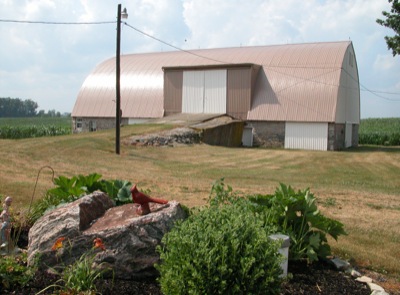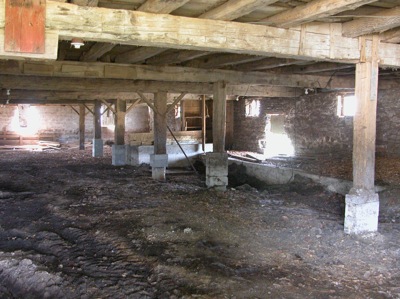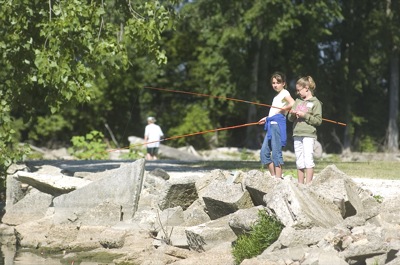Friday, July 13th, 2007
Convent history evident in St. Henry
By Shelley Grieshop

Photo by Shelley Grieshop/The Daily Standard
A bank barn along state Route 119, west of St. Henry, is one of the few remaining remnants of the former Himmelgarten Catholic convent property of the Sisters of the Precious Blood. The stone foundation, wooden floor and huge beams are original remains of the structure built in 1855 and owned today by Robert and Phyllis Reier.
ST. HENRY - Away from the bustling highway of state Route 119 lies a bank barn with a stone foundation rising out of one of the many hills on the farm property.
Built in 1855 under the direction of the Precious Blood Society, it was the largest Saxon-style barn in Mercer County at the time - 132 feet wide and 60 feet high - and was used by priests, brothers and sisters living on the land known as the Convent Himmelgarten. Historians say a team of horses could turn completely around inside the mammoth building.
The Himmelgarten convent, built in 1852, was one of 10 Catholic convents established among the German communities in northwest Ohio and Indiana by the Rev. Frances de Sales Brunner of Switzerland.
"I've always known about it (Convent Himmelgarten) from the time of my youth," said Dr. Allen W. Bernard, a St. Henry native who now resides in Cincinnati.
Several years ago Bernard published the book "Heaven's Garden in Ohio" referring to the man who sold the land, Henry Herman Hemmelgarn, and the reported translation of the name from German, which fittingly described the tranquil setting.
Bernard, who has written numerous publications about Mercer County history and genealogy, found several things quite unique about the convent located between the early parishes of St. Henry and St. Joseph. Two log homes on the property reportedly were haunted and some thought led to the sale of the property by Hemmelgarn.
Another oddity was the rank of duties held by the religious women living there.
"It was essentially controlled by the women who were really in charge of the brothers and priests who lived nearby," Bernard said.
Calling the situation "unnatural" for the era, Bernard said the Sisters of the Precious Blood were in charge of all the domestic activities of the convent's operations including the gardening, cultivation of fields and even the finances.
"The priests accounted to the sisters for all expenses such as their stipends, travel and donation," based on rules set forth by the founder of the Precious Blood Society, Gasper del Bufalo, Bernard wrote in his book.
Brunner purchased the sprawling Himmelgarten property and its 520 acres in 1852. The site not only served as homes for Precious Blood members, it was a seminary from 1859-1861, a temporary home for orphans and even "longterm visitors" called commorants, Bernard said.
"They weren't priests or nuns or any type of members of the (Precious Blood) community. Often they were people with mental challenges that they took in to work on the farm," Bernard said. "It was a real service they provided."
Some of the commorants were buried in the Himmelgarten Cemetery with the title "Comm.," written on their headstones. The cemetery behind the barn is no longer at the site; the bodies were exhumed years ago and moved to cemeteries at Maria Stein and the St. Charles Center.
A home for the priests and brothers was located near the roadway and was off-limits to the hardworking sisters, who also taught school across the road and in the St. Henry village.
In 1854, the chapel, convent and the first barn built on the property were destroyed by fire. Several years later a new brick convent was constructed and a two-story home for the priests, brothers and priest candidates.
In 1887, the archbishop decreed the separation of males and females in religious communities and the priests were removed two years later. In January 1901, the convent and a portion of the property still unsold were purchased for $13,746 by Fred Bimel of Portland, according to Bernard's research.
Bernard also notes in his book the controversy surrounding one of the priests who served at Himmelgarten, the Rev. Joseph Albrecht. The priest, known for his strictness and self-denial, persuaded some sisters and at least 50 local residents to leave the area and move to Oregon after he became disgruntled with some of the archbishop's decisions.
Today, the former Himmelgarten property is owned by Robert and Phyllis Reier, who purchased it in 1968 and tore down the convent building, southwest of their current home. Remaining at the site from the convent era is the barn's original stone foundation and much of the original wood, although the upper section of the barn was destroyed in a tornado in July 1960.
A small shed also remains on the property from convent days but was moved several yards from where it was first constructed. A grinding stone formerly used by the priests and sisters now graces the family's landscape.
One of the doors from the convent has been preserved by the Reiers in their home, and ceiling joists from the same building were reused by the family in another building, the couple said.
The Reiers sometime stand at the top of the grassy ramp near the entranceway of the upper level of the barn, and take in the view of the countryside.
"From here you can see pretty far," she said, contemplating what the earlier residents might have seen when they lived there more than 150 years ago. "Standing here really makes you think about life back then."

Photo by Shelley Grieshop/The Daily Standard
Large beams, some replaced through the years, help support the former Himmelgarten convent barn built on the side of a hill. The dirt floor was home to livestock, which was cared for by the priests, brothers and sisters of the Precious Blood in the mid 1850s.



